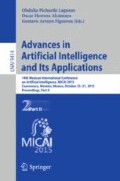Abstract
This paper presents a monitor assistant system for detection of dangerous events and health diagnostics for patients with dementia. The proposed framework brings together three different types of ambient intelligence: (i) sensors for detecting life-threatening events that can occur at home, like falls and anomalies in vital signs predicting risk of myocardial infarction; (ii) sensors placed under bed-posts for detecting unhealthy poor movement while patients are lying on the bed which can cause bedsores (decubitus); and (iii) analysis of the current cognitive state of patients with dementia by means of serious computer games. This paper presents the framework, methods and sensors used by our system to assist patients with dementia by triggering different type of alarm signals informing which patient needs what and how some help could be provided.
J.-E. Navarro-B. was with the GFaI, and is now with moovel GmbH.
Access this chapter
Tax calculation will be finalised at checkout
Purchases are for personal use only
References
Pantelopoulos, A., Bourbakis, N.G.: A survey on wearable sensor-based systems for health monitoring and prognosis. IEEE Trans. Syst. Man Cybern. Part C Appl. Rev. 40(1), 1–12 (2010)
Rashidi, P., Mihailidis, A.: A survey on ambient assisted living tools for older adults. IEEE J. Biomed. Health Inform. 17(3), 579–590 (2013)
United Nations: World Population Prospects: The 2010 Revision. http://esa.un.org/unpd/wpp
Bundesministerium für Familie, Senioren, Frauen und Jugend; Welt-Alzheimertag: Bundesfamilienministerium startet weitere Lokale Allianzen für Menschen mit Demenz. http://www.bmfsfj.de/BMFSFJ/Presse/pressemitteilungen,did=200434.html. Accessed 20 Sep 2013
Anders, J., Heinemann, A., Leffmann, C., Leutenegger, M., Pröfener, F., von Renteln-Kruse, W.: Dekubitalgeschwüre-Pathophysiologie und Primärprävention. Dtsch Arztebl Int 107(21), 371–382 (2010). doi:10.3238/arztebl.2010.0371
Rothgang, H., Müller, R., Unger, R., Weiß, C., Wolter, A.: BARMER GEK Pflegereport (2012)
Basak, C., Boot, W.R., Voss, M.W., Kramer, A.F.: Can training in a real-time strategy video game attenuate cognitive decline in older adults? Psychol. Aging 23(4), 765 (2008)
Iwainsky, A.: AMENAMIN: Ein Verbundprojekt im Grenzbereich von AAL und Micro Energy Harvesting. GFaI-Informationen 3, 3–4 (2012)
Maurer, R., Qi, R., Raghavan, V.: A linear algorithm for computing exact euclidean distance transforms of binary images in arbitrary dimensions. IEEE Trans. Pattern Anal. Mach. Intell. 25, 265–270
Kühn, S., Gleich, T., Lorenz, R., Lindenberger, U., Gallinat, J.: Playing Super Mario induces structural brain plasticity: grey matter changes resulting from training with a commercial video game. Mol. Psychiatry 19, 265–271 (2014)
Erbstößer, A-C.: Smart Home Berlin – von der Komfortzone zum Gesundheitsstandort. Technologiestiftung Berlin, Report (2015)
Acknowledgements
We gratefully acknowledge support from the German Federal Ministry for Economic Affairs and Energy (Bundesminesterium für Wirtschaft und Energie) for financial supporting the ZIM-KF project AMENAMIN - ambient energy and ambient intelligence for senior citizens in need of assistance [8]. We thank Dr. H.-M. Voigt and Dr. W. Harder, both former heads of the department of Adaptive Modelling and Pattern Recognition at the GFaI, for their leadership, support and contribution throughout the project AMENAMIN. We thank also Prof. J. Gallinat, (former professor of the Charité, Universitätsmedizin Berlin) for his contribution to the project AMENAMIN. We also thank our partners involved in the AMENAMIN project: the Charité Universitätsmedizin Berlin, EnOcean GmbH, alpha-board GmbH, SHK Spree Hybrid &Kommuniationstechnik GmbH and SMI GmbH. Finally, special thanks to Prof. Friedrich Porsdorf (Kunsthochschule Berlin) for the graphical design of the serious computer game.
Author information
Authors and Affiliations
Corresponding author
Editor information
Editors and Affiliations
Rights and permissions
Copyright information
© 2015 Springer International Publishing Switzerland
About this paper
Cite this paper
Navarro-Barrientos, J.E., Herfert, D., Iwainsky, A. (2015). Towards Ambient Intelligent Care and Assistance Systems for Patients with Dementia. In: Pichardo Lagunas, O., Herrera Alcántara, O., Arroyo Figueroa, G. (eds) Advances in Artificial Intelligence and Its Applications. MICAI 2015. Lecture Notes in Computer Science(), vol 9414. Springer, Cham. https://doi.org/10.1007/978-3-319-27101-9_22
Download citation
DOI: https://doi.org/10.1007/978-3-319-27101-9_22
Published:
Publisher Name: Springer, Cham
Print ISBN: 978-3-319-27100-2
Online ISBN: 978-3-319-27101-9
eBook Packages: Computer ScienceComputer Science (R0)

